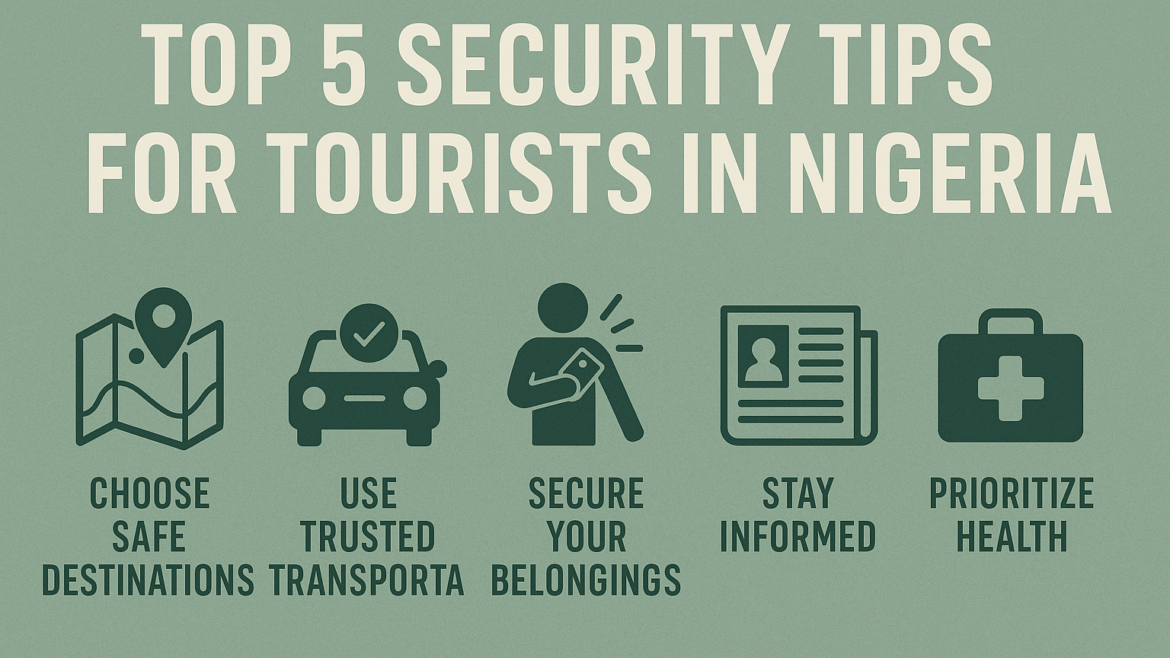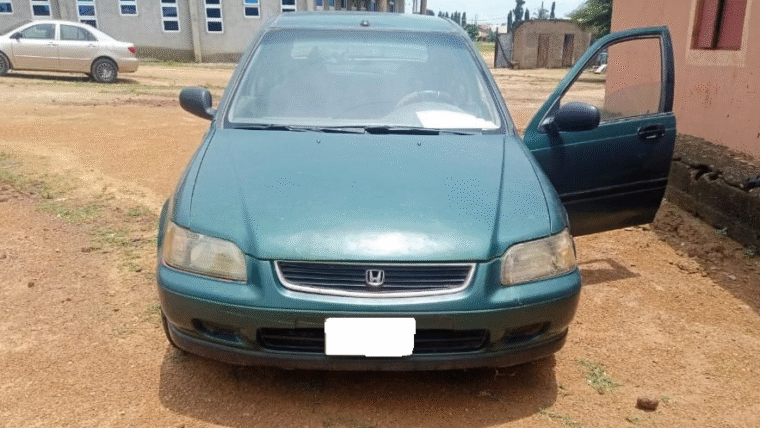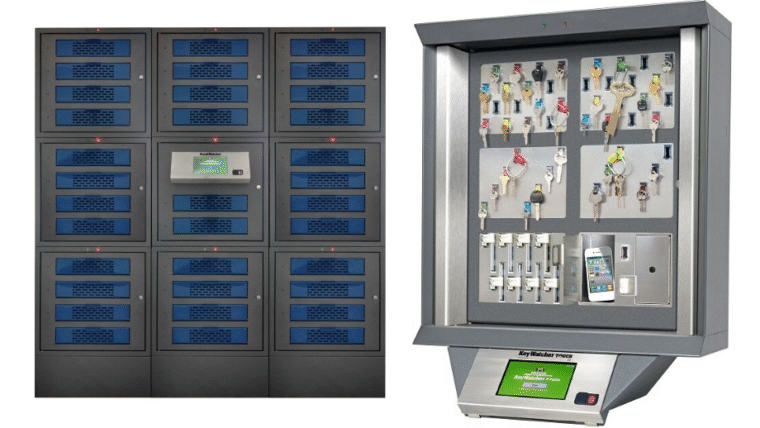Are you planning your visit to Nigeria and asking, What are the security tips for tourists in Nigeria? Nigeria is a country of striking contrasts—bustling cities, vibrant culture, warm hospitality, and scenic beauty. From the modern landscapes of Abuja to the pulsating rhythm of Lagos and the calm natural escapes in Calabar and Jos, the nation promises unique adventures. But for tourists, particularly first-time visitors, navigating safety concerns is an essential part of travel planning.
While the image of Nigeria in the global media can often appear intimidating, millions of tourists travel safely each year, particularly in well-known urban areas. The key lies in preparation, awareness, and following expert guidance. In this article, we explore five essential security tips for tourists in Nigeria, based solely on verified information from experienced travelers, official sources, and local insights.
5 Essential Security Tips for Tourists in Nigeria
Security Tips for Tourists in Nigeria #1: Choose Safe Destinations and Plan Ahead
One of the most foundational security tips for tourists in Nigeria is to select your travel destinations wisely. Safety in Nigeria is not uniform—while cities like Lagos, Abuja, Calabar, and Jos are relatively secure and even tourist-friendly, regions like Borno, Yobe, and parts of the Niger Delta face challenges such as insurgency and kidnapping.
Also read: 5 Ways to Protect Your Phone From Hackers
Lagos offers safe pockets like Victoria Island, Lekki, and Ikoyi, where nightlife, art galleries, beaches, and cultural landmarks abound. Abuja, Nigeria’s capital, is notably calmer and more structured, ideal for first-time tourists. Locations like Zuma Rock, Jabi Lake, and Millennium Park make Abuja a rewarding destination.
If you’re seeking an off-the-beaten-path experience, Osun-Osogbo Sacred Grove (a UNESCO World Heritage site), Gurara Falls, and Awhum Waterfall offer spiritual and natural experiences—but should be visited with trusted guides or in organized tours.
Plan Ahead:
- Check travel advisories from your home country.
- Use platforms like r/Nigeria or the Nigerian tourism portal (tournigeria.gov.ng) for current tips from locals.
- Understand local laws and customs to avoid accidental offenses.
Security Tips for Tourists in Nigeria #2: Use Trusted Transportation and Avoid Night Travel
Reliable transportation is critical for tourists in Nigeria. Avoid public transport such as okadas (motorbike taxis) and unmarked vehicles. Instead, opt for trusted services like Bolt, Uber, or hotel-provided taxis.
Driving yourself, particularly in cities like Lagos, is strongly discouraged due to erratic driving culture, heavy congestion, and safety risks—especially after dark. Several travelers report increased crime during nighttime hours, even in major cities.
Key Transportation Safety Practices:
- Use hotel pickup services when arriving at airports.
- Avoid moving between cities or traveling on unfamiliar roads after sunset.
- Never accept rides from strangers or unsolicited “VIP” transport services.
A common tip among experienced visitors: always know your route in advance, and if possible, travel with a local guide or friend. Having a local companion can help you avoid unsafe routes or scams.
Also read: Top 5 Security Products for the Home | 2025 Update
Security Tips for Tourists in Nigeria #3: Secure Your Belongings and Avoid Flashiness
In crowded areas like markets, bus terminals, and tourist spots, petty crimes like pickpocketing can occur. One of the core security tips for tourists in Nigeria is to stay low-profile. Nigeria is not a place to flaunt wealth—doing so can draw unnecessary attention.
What to Do:
- Store valuables like passports, jewelry, and excess cash in hotel safes.
- Carry a money pouch close to your body.
- Avoid displaying high-end gadgets or wearing expensive watches.
- Dress modestly, blending with local attire when possible.
In urban areas, smart-casual attire is common, while rural or conservative northern areas require more modest clothing—particularly for women. Covering shoulders and wearing longer skirts can help you respect local norms and avoid negative attention.
Also, avoid bringing unnecessary medications into the country. Always carry them in original packaging and with a prescription note from your doctor, as the Nigerian Federal Ministry of Health has regulations against certain medications.
Also read: Top 5 Security Products for the Office
Security Tips for Tourists in Nigeria #4: Stay Informed, Stay Connected, and Be Vigilant

Awareness is your first line of defense. Before and during your trip, stay updated on local news and consult your country’s travel alert system. Apps like Nigeria Breaking News can give real-time updates on traffic, protests, or emergencies from all the leading Nigerian newspapers. Avoid areas where demonstrations or rallies are taking place.
While locals are famously hospitable—offering directions, help, or stories—tourists should remain cautious of scammers posing as guides or offering too-good-to-be-true deals.
Practical Safety Practices:
- Register with your country’s embassy and sign up for alerts.
- Know Nigeria’s emergency numbers: 112 (general emergencies).
- Share your itinerary with family or friends and check in regularly.
- Use a VPN on public Wi-Fi and avoid doing sensitive transactions.
Tourists have reported sketchy Wi-Fi connections in public spaces. Cybercriminals may exploit unsecured networks, so a Virtual Private Network (VPN) is highly recommended. Alternatively, get a local SIM from MTN or Glo for private and consistent connectivity.
Also read: Top 8 Affordable Security Products for Your Home
Security Tips for Tourists in Nigeria #5: Prioritize Health and Environmental Safety
Health-related precautions are just as crucial as physical security. Nigeria’s climate, especially during harmattan (dry season), can affect sensitive travelers due to the heavy dust and poor air quality. Wearing N-95 masks helps during this period.
Health-Related Tips:
- Vaccinations: Yellow Fever vaccine is important. Check with your doctor for Hepatitis, Typhoid, Malaria, and Meningitis shots before arrival.
- Malaria Prevention: Carry and use mosquito repellents. Take prescribed antimalarial tablets.
- Food and Water: Drink only bottled water or use purifiers. Eat at reputable restaurants and avoid raw or street food of unknown hygiene.
- First-Aid: Carry a compact kit, including antiseptics, basic meds, and a thermometer.
- Accommodation: Choose hotels with strong safety records, 24/7 security, and emergency protocols.
If you’re sensitive to carbon monoxide or air pollutants, bring a portable carbon monoxide detector for indoor safety in hotel rooms, especially where generators are used.
Also read: Where Do I Get the Best Security Products and Services in Nigeria?
Frequently Asked Questions (FAQs)
Is Nigeria safe for first-time tourists?
Yes, with caution. Stick to Abuja, Lagos, Calabar, and other recommended areas. Use trusted transport and stay informed.
Can solo travelers explore Nigeria?
Yes, but it’s advised to hire a local guide and avoid remote areas or nighttime travel.
Are Nigerians friendly to foreigners?
Extremely. Most locals are warm and curious about tourists. Just be respectful of local customs.
Is travel insurance necessary?
Absolutely. It helps in the event of medical emergencies, theft, or travel interruptions, especially since emergency services outside Lagos or Abuja may be limited.
What should LGBTQ+ tourists know?
Same-sex relationships are criminalized in Nigeria. Public affection or activism could lead to arrest or fines. Exercise discretion and STAY AWAY from areas where Sharia law is enforced.
Conclusion: Is Nigeria Safe for Tourists?
Yes, Nigeria can be safe for tourists, especially when smart precautions are taken. Cities like Lagos and Abuja are home to thriving expat communities, cultural attractions, and countless local guides who are eager to help you explore safely. The local hospitality is unmatched, and visitors frequently speak of locals going out of their way to ensure their safety.
Tourists who stick to well-known locations, follow trusted travel tips, and stay updated on current conditions often report positive, memorable experiences.
Avoid areas with known risks, like Borno, Yobe, and parts of the Niger Delta. Refrain from traveling at night, and don’t take unnecessary risks by venturing into unknown rural regions without verified guides.
Security tips for tourists in Nigeria are not about promoting fear—they are about empowering you to experience this fascinating country with confidence and clarity.
Stay connected to this blog for more security updates. Follow us on X (formerly Twitter) @Logic_sss for access to quick updates.
Recommendations
- Top 8 Affordable Security Products for the Office
- Where Do I Buy Smart Locker Storage Systems in Nigeria?
- Trace Detection Equipment: Where are they Used?
- Computed Tomography X-ray: All you Need to Know
- What is Automatic Key Control System | All You Need to Know
References
- www.touristplaces.guide – How Safe Is Nigeria for Tourists?
- www.omowumisblog.com – 10 Essential Safety Tips for Travelers in Nigeria
- www.travelsafe-abroad.com – Is Nigeria Safe? Crime Rates & Safety Report
- www.travellikeaboss.org – Is It Safe to Travel in Nigeria: Essential Tips and Insights for Your Journey



